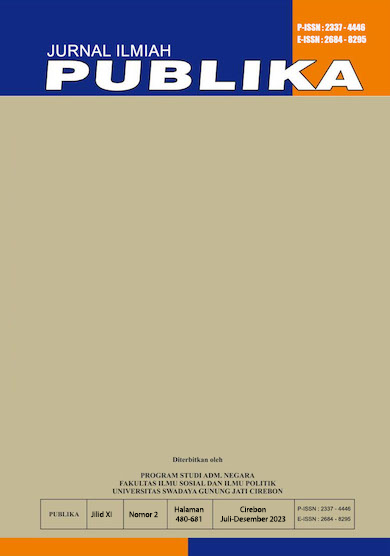FUNGSI BADAN PERMUSYAWARATAN DESA DALAM MENAMPUNG DAN MENYALURKAN ASPIRASI MASYARAKAT DESA
DOI:
https://doi.org/10.33603/publika.v11i2.8854Abstract
References
Mardikanto, Dkk. 2015. Pemberdayaan Masyarakat Dalam Perspektif Kebijakan Publik. Bandung: Alfabeta.
Moleong, J Lexi. 2012. Metodologi Penelitian Kualitatif. Bandung: PT. Rosdakarya
Profil Desa Tlekung. Tahun 2020
Sadhana, Kridawati. 2010. Etika Birokrasi Dalam Pelayanan Publik. Malang: CV Citra Malang.
Sari, I. N., Fajarianto, O., Kurniawan, C., Wulandari, T. C., & Marlina, E. (2023). Jabung Village Dairy Farmers: Milk Education Center. Dinamisia: Jurnal Pengabdian Kepada Masyarakat, 7(1), 209-214.
Solekhan,Moch. 2014. Penyelenggaraan Pemerintahan Desa Berbasis Partisipasi Masyarakat. Malang: Setara Press.
Sudrajat, D., Siswondo, S., Harsono, Y., & Fajarianto, O. (2023). THE INFLUENCE OF LEADERSHIP STYLE AND WORK DISCIPLINE ON EMPLOYEE PERFORMANCE. International Journal of Economics, Business and Accounting Research (IJEBAR), 7(2), 641-648.
Sugiyono. 2014. Metode Penelitian Kuantitatif, Kualitatif, dan R & D. Bandung:Alfabeta
Sugiyono. 2015. Metode Penelitian Pendidikan: Pendekata Kuantitatif, Kualitatif, dan R&D. Bandung: Alfabeta.
Undang-undang RI Nomor 6 Tahun 2014 Tentang Desa. https://www.dpr.go.id/dokjdih/document/uu/UU_2014_6.pdf_akses tanggal 22 September 2023.
Peraturan Mentri Dalam Negri Republik Indonesia Nomor 110 Tahun 2016 tentang Badan Permusyawaratan Desa. https://www.bandungkab.go.id/uploads/20180320091312-permendagri-no-110-thn-2016-ttgbpd.pdf_akses tanggal 22 September 2023.
Yenni Arnas, Andy Ahmad, & Fajarianto, O. (2023). The Effectiveness of Learning Management System in Higher Education: A Case Study of Social Sciences Course Content. IJESS International Journal of Education and Social Science, 4(2), 114-118.
Downloads
Published
Issue
Section
Citation Check
License
The Authors submitting a manuscript do so on the understanding that if accepted for publication, copyright of the article shall be assigned to Jurnal Ilmiah Publika Prodi Administrasi Publik. Universitas Swadaya Gunung Jati as publisher of the journal. Copyright encompasses rights to reproduce and deliver the article in all form and media, including reprints, photographs, microfilms, and any other similar reproductions, as well as translations.
Jurnal Ilmiah Publika, Universitas Swadaya Gunung Jati and the Editors make every effort to ensure that no wrong or misleading data, opinions or statements be published in the journal. In any way, the contents of the articles and advertisements published in Jurnal Ilmiah Publika are the sole responsibility of their respective authors and advertisers.










